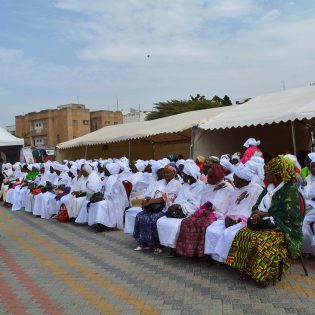Le Sénégal s’Engage: la Religion et la Santé familiale (Senegal Engage: Religion and Family Health) is a new ENGAGE presentation that serves as an advocacy tool to connect reproductive health and family planning issues with faith-based attitudes and beliefs.
Drawing on community and faith leaders, the presentation links the impacts of family planning and birth spacing with positive outcomes for the care, nutrition, and education of children as well as natural resources. The presentation illustrates how family planning improves the health of mothers and children and contributes to the well-being of Senegalese families. Breaking down complex concepts and using nontechnical language, the presentation shows how religious leaders in Senegal can guide families so that they can lead a spiritual, happy, and healthy life.

Participants at Senegal’s Week of Child and Maternal Health fair.
Stakeholders from diverse sectors within Senegal will use this resource to promote policy dialogue about the critical role faith leaders can play in supporting family planning goals for the country. The presentation includes recommendations for religious leaders on how they can speak with families as well as other faith leaders about family health and use of modern contraceptive methods.
This ENGAGE presentation was developed by the PACE Project in collaboration with la Direction de la Santé de la Reproduction et de la Survie de l’Enfant (DSRSE) at the Ministère de la Santé et de l’Action Sociale (MSAS) and Cadres des Religieux pour la Santé et le Développement (CRSD) who led a task force made up of Senegalese health experts and religious leaders.
- Présentation avec une narration (MP4: 263MB)
- Présentation sans narration Flash (ZIP: 124MB)
- Présentation sans narration HTML5 ( ZIP: 448MB)
- Messages Clés ( PDF: 2.2MB)
- Sénégal Guide d’Utilisation ( PDF: 583KB)
- Formulaire pour rapporter sur les activités de diffusion( DOC: 13KB)
السنغال يتعهد: الدين وصحة الأسرة
- Présentation en Arabe avec une narration (MP4: 244MB)
- Présentation en Arabe sans narration Flash (ZIP: 244MB)
- Présentation en Arabe sans narration HTML5 ( ZIP: 442MB)
- Récit de la Présentation en Arabe ( PDF: 1.5MB)
- Messages Clés en Arabe ( PDF: 1.6MB)
- Messages Clés en Arabe ( DOC: 13MB)
Senegal is taking maternal and child health (MCH) seriously. To raise awareness about MCH issues, the government joined forces with a range of stakeholders to launch the official Week of Child and Maternal Health on Feb. 6, with a weeklong public fair in the Place de l’Obélisque in central Dakar that attracted more than 1,000 people. Similar fairs will be held in communities across the country over the next few years and are intended to offer people the opportunity to learn about their health and how to be in control of it.
The Dakar fair also provided a powerful venue for the premiere of the ENGAGE presentation, Le Sénégal s’Engage: la Religion et la Santé familiale, that highlights the strong relationship between reproductive health and family planning issues with traditional religious values that support family health. Population Reference Bureau developed the presentation in close partnership with technical experts from the government of Senegal’s Department of Maternal and Child Health (DSME) and religious leaders from the Cadre des Religieux pour la Santé et le Développement (CRSD). The presentation was produced under the Policy, Advocacy, and Communication Enhanced for Population and Reproductive Health (PACE) project funded by the United States Agency for International Development (USAID).
The partners sought a presentation that would support Senegal’s ongoing efforts to significantly reduce its maternal and child mortality rates through reproductive health and family planning strategies. Using images, the most current data, and some key scripture passages, the presentation illustrates the links between family planning and birth spacing for improved maternal and child health and the overall well-being of Senegalese families, which is a key concern of faith leaders. It also touches on the inextricable link between health, poverty, food insecurity, and the environment. Breaking down complex concepts and using nontechnical language, the presentation shows how religious leaders in Senegal can guide families so that they can lead spiritual, happy, and healthy lives.
The presentation aligns with Senegal’s package of projects and reforms known as the Plan Sénégal Emergent, which emphasizes social and economic reforms, including significant investments in health. It was shown at the MCH fair’s opening ceremony. Abdoulaye Diouf Sarr, the minister of Health and Family Welfare, along with religious leaders from each of Senegal’s 14 districts and leading representatives from USAID and other global health funders, welcomed the large crowd and spoke fervently about Senegal’s commitment to improving the lives of women and children, and their commitment to ensuring universal health care and strengthening community-level activities to improve the quality of care.
With funding from the U.S. Agency for International Development, PACE—Policy, Advocacy, and Communication Enhanced for Population and Reproductive Health (PACE)—increases support among policy audiences for effective health and population programs around the world. By increasing the flow of accurate, understandable information about population, family planning, and reproductive health to policy audiences, PACE enhances efforts carried out by civil society, the public sector, the development community, and donors. Under PACE and previous projects, PRB has developed a series of dynamic multimedia ENGAGE presentations to engage global leaders and country-level policymakers in issues related to family planning, reproductive health, and other key development issues.

